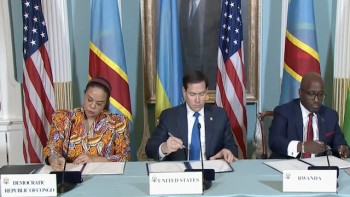On December 31, 2010 The Guardian published an article by Mr Stephen Kinzer, a US journalist and author. In the article, titled "End human rights imperialism now” ( see here): Steven Kinzer attacks human rights groups, singling out the reputable Human Rights Watch for having "lost their way by imposing western, 'universal' standards on developing countries.” Unfortunately Stephen Kinzer's arguments are based on the fallacies and contradictions he set out to denounce and suffer at least three major flaws: they contradict his own stated principle of the universality of American Values, they target the wrong culprits, and they are based on wrong premises and bad examples.
Stephen Kinzer contradicts his recent statements criticizing the US foreign policies. In a Winter 2010 interview with Imagineer Magazine(see here:http://www.imagineermagazine.com/index.php/issue_archives/autumn/stephen_kinzer) Mr. Kinzer stated:
"The effects of U.S. intervention in Latin America have been overwhelming negative. They have had the effect of reinforcing brutal and unjust social systems and crushing people who are fighting for what we would actually call 'American values.' In many cases, if you take Chile, Guatemala, or Honduras for examples, we actually overthrew governments that had principles similar to ours and replaced those democratic, quasi-democratic, or nationalist leaders with people who detest everything the United States stands for."
What are those American values? Aren't human rights part of our American values?
For Stephen Kinzer there are human rights for the developed people and those for the poor, underdeveloped countries. This view undermines the "American Values" concept. Kinzer’s logic may be understood like this: give food, education, clean water to people in underdeveloped countries but arrest or kill them when they ask for impartial, just, and democratic institutions, because they cannot be hold to American standards! He makes a dicto simpliciter argument by claiming that the aspirations for human rights around the World are a product of the elitist Western societies promoted by out-of-touch human rights organizations.
In fact, rights movements, through which people raised up to overthrow undemocratic and tyrannical regimes or oppressors have a long history in Africa and in other so called underdeveloped countries, before Amnesty International or Human Rights Watch were created. The Nelson Mandela, Ghandi, Chaka Zulu were not puppets created by the Western organizations castigated in Stephen Kinzer's article. These human rights and revolutionary movements were not all about food or clean water. They were mostly about freedom, equality, social justice and other values beyond basic human needs. In fact, it is when people are free from the yoke of oppression that good food, clean water, and electricity can be fully enjoyed.
The concept of "Secondary rights" is clearly an oxymoron in a society that respects the rights of the citizens. Stephen Kinzer builds his argument on contradictory premises and wedge argument when citing the example of "the right to form a radical newspaper" or "an extremist political party." Take the example of Rwanda. When Paul Kagame and his Rwandan Patriotic Front (RPF) were fighting the late Juvenal Habyarimana's regime, the regime labeled them “extremists.” After the RPF victory, Kagame applied the label to his own opposition. The determination of who are radical or extremist needs to be based on a reference, through universal sets of norms commonly understood, not on contradictory premises and false analogies. American Values are such best standards and norms.
Corollary to this is the example of Human Rights Watch, the target of the article.
The irony in Steven Kenzer crusade against human rights organizations lies in the fact that when Human Rights Watch approved of RPF actions, it was hailed as an example to follow and RPF rolled out the red carpet for the late Alison DesForges, the Human Rights Watch expert on Rwanda. Alison DesForges was declared “persona non grata” as soon as she revealed that the RPF regime was committing the very same crimes the former regime was accused of. Consequently, Human Rights Watch became a whipping boy of Paul Kagame's bullying tactics. Hence, the case against Human Rights Watch is moot, especially when one is at the same time trying to make a case for Paul Kagame and the RPF.
Using Paul Kagame to show the failure of human rights organization is not only a fallacy, but also a very bad example. To the risk of being accused of "poisoning the well", it is worth mentioning that Stephen Kinzer wrote an eulogic biography (A Thousand Hills: Rwanda’s Rebirth and the Man Who Dreamed It [2008]) of Paul Kagame, the most notorious African tyrant, accused by French and Spanish anti-terrorist judges and the United Nations of terrorism, war crimes, crimes against humanity, genocide, and the assassination of two African presidents and Spanish and French citizens, including Catholic missionaries and humanitarians.
Paul Kagame's bloody enterprise has cut short the lives of more than 6 millions victims including babies, women and elderly, a pogrom surpassed only by the jewish Shoah. If by Stephen Kinzer' standards, Paul Kagame's "regime is the best thing that has happened to Rwanda since colonialists arrived a century ago," then these standards must be at the opposite side of common sense.
In reality, Paul Kagame's regime is the worst regime if one looks at all aspects, from human rights to the human development. The article "Rwanda: when statistics lie" (see here), shows that even what is called human development is really negative development in real terms. The regimes before RPF have recorded consistent positive development. Even if Kagame’s RPF had recorded economic development, it did not start from a jungle, a country inhabited by Neanderthals; it built on the foundations created by the previous regimes. Hence, affirming mordicus that the current development was caused by the advent of a single regime is a post hoc ergo propter hoc argument.
With the example of Biafra and even Darfur, Stephen Kinzer is letting the camel's nose in the tent, if not making a non sequitur argument. The failures of Biafra and Darfur do not necessarily mean the resolution of posterior cases will meet the same fate. There were major failures in Biafra then as there are in Darfour today. However, the problem was and is less due to the intervention of human rights organizations than to the incompetence of corrupt African leaders themselves and the pervasive issue of ethnic politics in undemocratic societies. The symptoms of the unresolved issue of human rights (democracy, justice, and equitable distribution of resources) in Biafra manifest themselves through the on-going Niger Delta unrests, and what we see in Darfour, South Sudan, Eastern Democratic Republic of the Congo mirrors the Biafra and Niger Delta situation.
In conclusion, “Human Rights”, like “American Values” are not for Western civilizations or elite only; they are universal. Democratic nations give their "people jobs, electricity, and above all security" and at the same time they do neither limit political speech, nor arrest political oppositions, nor assassinate human rights activists or journalists. Unless Rwanda and other countries where people are oppressed defy history, there can never be peace without the respect of the universal human rights.
Human rights organizations have not lost their way by imposing 'universal' standards. As far as people who seek or aspire to these rights are concerned, Human Right Watch, Amnesty International, and other similar groups can only keep their way by promoting those universal rights everywhere.
Freedom fighters should be glad that Human Rights Watch has at the helm James F. Hoge, Jr, a personality of such a caliber in promoting human rights. Tyrants around the world should and must be worried that Foreign Affairs Magazine, the bi-monthly magazine of analysis and commentary on international affairs and U.S. foreign policy, published the article denouncing them when James Hoge, Jr was the Editor.
Felicien Kanyamibwa, PhD.
New Jersey, USA
January 5, 2011
The Fallacies of Stephen Kinzer: Human Rights is A Tyranny - Case of Rwanda
Typography
- Smaller Small Medium Big Bigger
- Default Helvetica Segoe Georgia Times
- Reading Mode

















